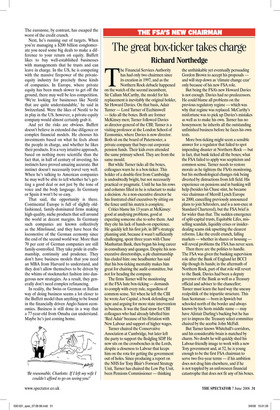The great box-ticker takes charge
Richard Northedge
The Financial Services Authority has had only two chairmen since its creation in 1997, and as the Northern Rock debacle happened on the watch of the second incumbent, Sir Callum McCarthy, the model for his replacement is inevitably the original holder, Sir Howard Davies. On that basis, Adair Turner — Lord Turner of Ecchinswell — ticks all the boxes. Both are former McKinsey men; Turner followed Davies as director-general of the CBI; Turner is a visiting professor at the London School of Economics, where Davies is now director. Both sit on the board of Paternoster, a private company that buys out corporate pension funds. Their kids even attended the same primary school. They are from the same mould.
But while Turner ticks all the boxes, colleagues warn he is a box-ticker. This holder of a double-first from Cambridge is undoubtedly bright, but not necessarily practical or pragmatic. Until he has his rows and columns filled in he is reluctant to make a decision. As a non-executive director he has frustrated chief executives by sitting on the fence until his matrix is complete.
Critics blame his 13 years at McKinsey: good at analysing problems, good at expecting someone else to solve them. And they cite his lack of hands-on experience. He quickly left his first job, in BP’s strategic planning unit, because it wasn’t sufficiently challenging, spent three years with Chase Manhattan Bank, then began his long career in consultancy and quangos. Despite his nonexecutive directorships, a plc chairmanship has eluded him: one headhunter has said that his box-ticking mentality makes him great for chairing the audit committee, but not for heading the company.
The firms Turner will be monitoring at the FSA hate box-ticking — demands to comply with every rule, regardless of common sense. Yet when he left the CBI he wrote Just Capital, a book defending red tape and arguing for more state intervention in business. It was the final straw for CBI colleagues who had already labelled him ‘Red Adair’ because of his flirtation with New Labour and support of higher wages.
Turner chaired the Conservative Association at Cambridge, but later left the party to support the fledgling SDP. He now sits on the crossbenches in the Lords, despite a closeness to Labour that keeps him on the rota for getting the government out of holes. Since producing a report on the NHS for Tony Blair’s Forward Strategy Unit, Turner has chaired the Low Pay Unit, been Pensions Commissioner — thinking the unthinkable yet eventually persuading Gordon Brown to accept his proposals — and will step down as ‘climate change czar’ only because of his new FSA role.
But being the FSA’s new Howard Davies is not enough. Davies had no predecessors. He could blame all problems on the previous regulatory regime — which was why that regime was replaced. McCarthy’s misfortune was to pick up Davies’s mistakes as well as to make his own. Turner has no honeymoon: he inherits all the outstanding unfinished business before he faces his own tests.
More box-ticking might seem a sensible answer for a regulator that failed to spot impending disaster at Northern Rock — but in fact, that bank ticked all the boxes; what the FSA failed to apply was scepticism and common sense. Turner needs to restore morale as he tightens the FSA’s monitoring, but his methodological changes risk being diverted by distractions from left field. His experience on pensions and in banking will help (besides his Chase stint, he became vice chairman of Merrill Lynch Europe in 2000, cancelling previously announced plans to join Schroders, and is a non-exec at Standard Chartered), but the FSA brief is far wider than that. The sudden emergence of split-capital trusts, Equitable Lifes, misselling scandals, liquidity crises or insiderdealing scams risk upsetting the clearest reforms. Like the credit crunch, falling markets — whether in shares or housing — will reveal problems the FSA has never seen.
Then there are the politics to handle. The FSA was given the banking supervision role after the Bank of England let BCCI slip though its hands; in the aftermath of Northern Rock, part of that role will revert to the Bank. Davies had been a deputy governor of the Bank as well as a Treasury official and adviser to the chancellor; Turner must learn the hard way the uneasy realpolitik of the tripartite structure. This faux Scotsman — born in Ipswich but schooled north of the border and always known by his Scots middle name — may have Alistair Darling’s backing but he has yet to impress the Treasury select committee chaired by the acerbic John McFall.
But Turner knows Whitehall’s corridors, and his considerable brain is matched by charm. No doubt he will quickly shed his Labour-friendly image to work with a new Tory government and, at 52, he is young enough to be the first FSA chairman to serve two five-year terms — if his ambition does not drag him elsewhere, and if he is not toppled by an unforeseen financial catastrophe that does not fit any of his boxes.










































































 Previous page
Previous page